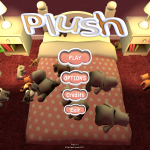WARNING! Great advices below. Nadbor, the creator of the web game called Turing has learned a lot by creating his game and wants to share his experience with us. Keep reading!
Tell us something about yourself
I’m a failed physicist – grad school dropout – turned programmer. I currently work in an ad agency developing bidding algorithms for real time bidding. In my free time I run programming workshops for schoolchildren, make games and study for quant interviews. I love math, physics, video games and problem solving of any kind.
What is your game about?
Turing is a robo-flavored puzzle game about programming. It consists of some easy and some not so easy algorithmic problems expressed in a way understandable by both a 10-year old and his grandma. As such it can be used as a resource for teaching programming to children, but even experienced developers find some of the levels challenging (I am told).
Where did the game idea come from?
http://pleasingfungus.com/Manufactoria/
What can you tell us about the development of the game?
It was all me, it took me most of the evenings and weekends from January to June 2013.
What is the most important thing you learned when making this game?
Deliberating over the best possible choice of technology/style/architecture/whatever actually takes more time than just going with any choice and getting to work right away. And that’s even if it means sometimes wasting time on dead end ideas. Actually no time you spend working is wasted – you will be that much smarter for it.
What advice would you tell people who are beginning with game development?
- Don’t wait for a better time. Start working now. Don’t try to learn everything before you start. You will learn as you go.
- Prototype everything. In code, on paper – whatever. It will let you find flaws in your game at a stage when they are still easy to fix (or change direction altogether). It will also allow you to easily communicate your idea to others maybe even ignite some interest
- Don’t go bragging about your game until you have actually something to show – you will be more motivated to work this way. You would think that having friends waiting for the creation that you announced would be motivating but it’s not. It makes you spend all your action points on talking and not working. It’s much better to set yourself a goal like: I will post on fb that I’m making a game no sooner than when I have the first level ready.
- Don’t take game advice from non-gamers. They have no clue and are in general awful human beings
- Use an IDE. I know notepad++ is awesome, but after a couple hundred lines of code things start to get messy
- Pretty much regardless of you own skill level you are going to meet more experienced programmers. Some of them are going to trash-talk the technology you are using and all of your design choices. If they offer very concrete, achievable alternatives – then maybe listen to them. Otherwise – avoid at all cost. If everyone spent time trying to satisfy standards of elitist grumps, nothing would ever get done. First make a game that works, perfection will come later.
Thanks for all of your advices! Your effort is shown on your game and we wish you the best.
[button link=”http://turing-game.pl/” target=”_blank” style=”none, small, large, biglarge” title=”PLAY Turing here”][/button]






